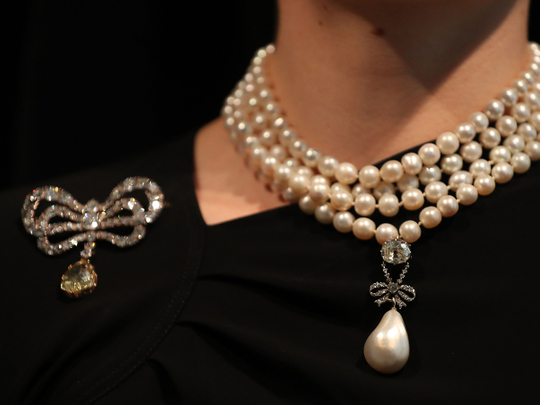
Geneva: A pearl and diamond pendant owned by Marie Antoinette before she was beheaded during the French revolution sold for $36 million (Dh132 million) at an auction on Wednesday, shattering its estimated sale price of up to $2 million.
The Sotheby’s auction at an ultra-luxurious hotel on the banks of Lake Geneva saw feverish bidding for a 10-piece collection owned by the ill-fated queen, featuring jewels unseen in public for two centuries.
The 10 pieces, which had been estimated to fetch a total of roughly $3 million, sold for a combined total of nearly $43 million, Sotheby’s said.
In one example, a diamond brooch pegged to go for roughly $80,000 sold for $1.75 million.
But the highlight was the natural pearl and diamond pendant, which Sotheby’s said went to an anonymous, private buyer, without giving further details.
Marie Antoinette’s dazzling treasures had been held by the Italian royal House of Bourbon-Parma.
The jewels have followed a winding path highlighting European power dynamics in the 18th and 19th centuries.
According to accounts written by the queen’s lady-in-waiting, Madame Campan, Marie Antoinette spent an entire evening in the Tuileries Palace wrapping all her diamonds, rubies and pearls in cotton and enclosing them in a wooden chest.
They were sent to Brussels, governed by her sister Archduchess Marie-Christine, before being sent on to the French queen’s native Austria, and into the safe-keeping of her nephew, the emperor.
In 1792, the royal family was imprisoned in Paris. The king and queen were executed the next year, and their 10-year-old son died in captivity.
Only their daughter, Marie Therese of France, survived. She was sent to Austria in 1796, where she was given her mother’s jewels.
She had no children herself, but passed on the treasures to her niece and adopted daughter, Louise of France, Duchess of Parma, who in turn left them to her son, Robert I (1848-1907), the last ruling Duke of Parma.
They have been privately owned by relatives ever since.












